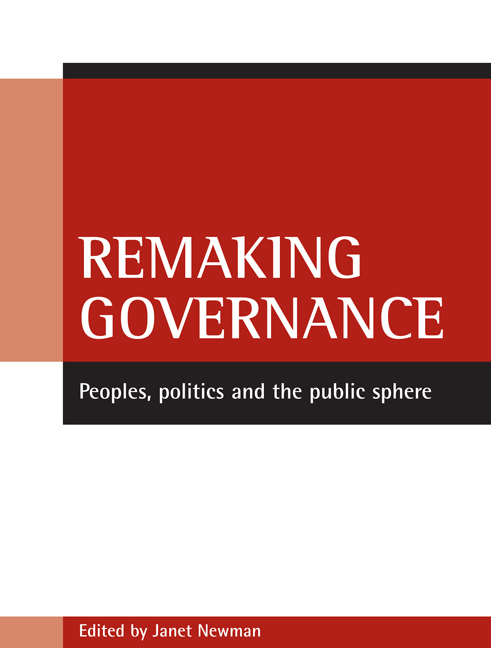Book contents
- Frontmatter
- Contents
- List of tables and figures
- Acknowledgements
- Notes on contributors
- Introduction
- one Reconstituting Europe: governing a European people?
- two Governance and the constitution of a European social
- three Remaking European governance: transition, accession and integration
- four Regendering governance
- five Welfare governance and the remaking of citizenship
- six Participative governance and the remaking of the public sphere
- seven Promoting democratic governance through partnerships?
- eight Among everyday makers and expert citizens
- nine Governance and the transformation of political representation
- Conclusion
- Index
five - Welfare governance and the remaking of citizenship
Published online by Cambridge University Press: 18 January 2022
- Frontmatter
- Contents
- List of tables and figures
- Acknowledgements
- Notes on contributors
- Introduction
- one Reconstituting Europe: governing a European people?
- two Governance and the constitution of a European social
- three Remaking European governance: transition, accession and integration
- four Regendering governance
- five Welfare governance and the remaking of citizenship
- six Participative governance and the remaking of the public sphere
- seven Promoting democratic governance through partnerships?
- eight Among everyday makers and expert citizens
- nine Governance and the transformation of political representation
- Conclusion
- Index
Summary
Introduction
Dynamic change in the relationships between states and citizens is a feature of countries undergoing programmes of welfare reform and restructuring. Such changes involve new ways of ‘governing the social’ in which citizens are expected (or themselves expect) to play more active roles in handling risks and promoting their own welfare. In this chapter we trace the implications of active citizenship for welfare governance. Following Kjær (2004, pp 12–15), we define governance as “the setting, application and enforcement of the rules of the game” in a way that enhances legitimacy in the public realm. We use the term ‘dynamics’ advisedly: we argue that contemporary changes in welfare governance and citizenship are not the result of a simple oneway process where, for example, external pressures on nation-states bring about new forms of governance and citizenship, or where changes in citizens’ capabilities and demands force states to change. Rather, these dynamics must be captured as mutually reinforcing processes, transforming modes of governance as well as the scope for citizen choice, participation and self-directed activity.
The turn to active citizenship leads to a more complex and diversified relationship between states and citizens, opening up new strategies on the part of both. Some strategies can result in an intensification of the practices through which some groups are marginalised or excluded (for example, along lines of gender, ethnicity, disability or previous labour market experience), while other strategies may produce more inclusive forms of welfare governance. The implications of active citizenship will vary between different national welfare states, reflecting established patterns of state–citizen relations. Hence we need to analyse the emerging relationship between welfare governance and active citizenship in ways that are sensitive to the ambiguities and paradoxical effects of reform in specific national – and transnational – contexts. The chapter is based on research in the Nordic countries, but provides frameworks through which the dynamics of change in other nations can be understood.
The turn to active citizenship
Contemporary welfare states face pressure from many sources. A widely shared understanding is that the ‘stateness’ of welfare states is challenged ‘from above’, whether this process is framed as globalisation, Europeanisation or denationalisation (Beck, 2000; Rieger and Leibfried, 2003; Wincott, 2003).
- Type
- Chapter
- Information
- Remaking GovernancePeoples, Politics and the Public Sphere, pp. 101 - 118Publisher: Bristol University PressPrint publication year: 2005
- 4
- Cited by



